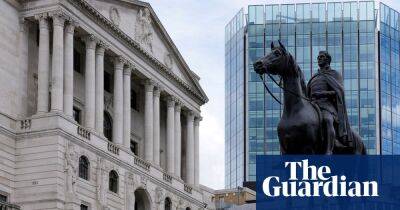UK’s cost of borrowing on international markets overtakes Greece and Italy
Britain’s cost of borrowing on international money markets has jumped above the rates paid by Greece and Italy as traders priced in a higher risk of default on UK government debt.
After frantic selling since Kwasi Kwarteng’s mini-budget last Friday, the five-year UK government bonds suffered a dramatic fall in value, which had the effect of doubling the interest rate on the debt since August.
The five-year bond rose to 4.3%, which compares with Italy’s 3.87% and the 4% rate of interest paid by Greece. France maintained a rate of 2.3% while German five-year bonds traded with an interest rate, referred to as the yield, at 2.03%.
The former Bank of England deputy governor Charlie Bean said it was significant that bond markets now considered Greece and Italy to be safer bets after several days of panic selling.
“It now costs the UK government more to borrow than Italy or Greece, who we have traditionally thought of as being not quite basket cases, but certainly weaker-performing sovereign entities.”
He said the central bank should have reacted to the market turmoil by calling an emergency meeting, and that the lesson of urgent interventions was “you go big, and you go fast”.
He added: “On this occasion if I had still been at the Bank in my role as deputy governor I certainly would have been counselling the governor that I think this is one of those occasions where it might have made sense [to call a meeting].
“The key thing is, if you call it, you have to take significant action.”
The Bank of England’s governor, Andrew Bailey, issued a statement on Monday that emphasised the central bank’s willingness to raise rates in its fight against inflation, but stopped short of announcing an emergency rate rise as some had expected.
Some
Read more on theguardian.com






















